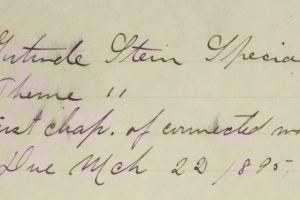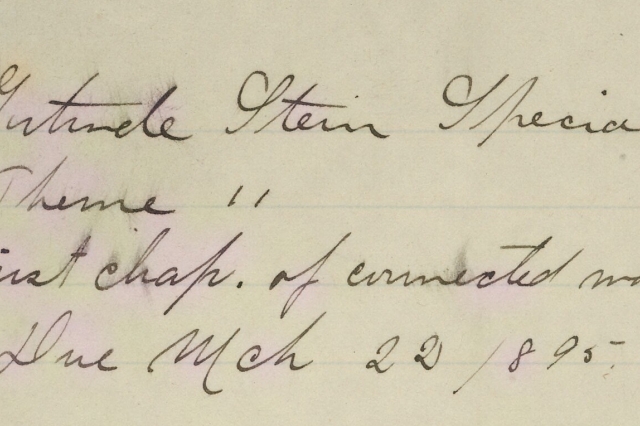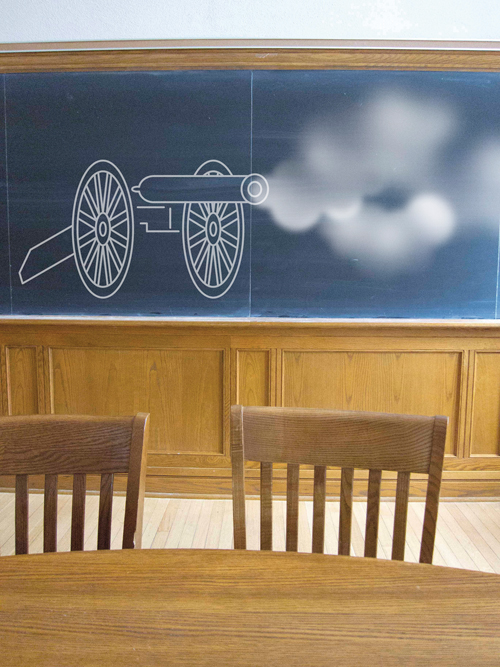“Daily Themes,” Decoded
About The Author:
In addition to successfully defending our honor on College Bowl in 1969, Michael is a nationally syndicated radio host, podcaster and a prolific author.
When we recollect the most cherished aspects of our “bright college years”, I suspect that few of us will focus on memories of course work and classrooms.
 The exception for me comes from the only class at Yale I loved so passionately that I insisted on repeating it: with two semesters in sophomore year, followed by two more as a junior. I secured special permission to do the class twice, and I probably would have taken it a third time if they had let me.
The exception for me comes from the only class at Yale I loved so passionately that I insisted on repeating it: with two semesters in sophomore year, followed by two more as a junior. I secured special permission to do the class twice, and I probably would have taken it a third time if they had let me.
English 77, universally known as “Daily Themes”, carried an honorable title as the oldest, continuously offered course in the university’s history. Some rumors claimed that the class pre-dated the US Constitution, but a more responsible perspective identifies its actual origins in the 1830’s.
By the late 1960’s, the pattern had been well set: for those who signed up for the ordeal, you committed yourself to turn out a “theme” — in effect, a very brief short story of about 350 words — that you would turn in every weekday morning, without fail. The instructors proved resolute and reliable in collecting these submissions, and if you failed to deliver, the consequences could be dire: If you missed more than two days in a semester, you could be booted from the class. No one I knew dared test this reputed rule, but in both years that I struggled through the course, a number of classmates bagged the effort mid-semester in frustration.
In addition to submitting the themes each day, we attended weekly “tutorials” — private conferences with an assigned instructor about our personal progress as writers. A general session summoned on Fridays or Thursdays, in which faculty read aloud selections from the best work of the week. As I recall, they never identified the authors of the pieces they commended, and certainly never humiliated the hapless scribblers whose sloppy or incoherent compositions they occasionally fingered as examples to avoid.
In recalling Daily Themes, I inevitably think of the winter season: staying awake long past midnight, pecking at my Olivetti portable typewriter in my Branford College room, then venturing out at two or three in the morning, shuffling over treacherous, icy streets, to drop the completed masterpiece into the slot, so I’d be free the next morning to wolf down breakfast and show up to early classes.
Trying to calculate the sheer number of these little pieces I prepared, I must have generated more than 300 of them in the two full years I took the course.
What do I remember of this prodigious output? Almost nothing, I’m afraid, though I know that many of the themes centered around the hitch-hiking/road trip adventures that became an obsession with me shortly before I graduated from high school. I also punched out several pieces that tried to follow the example of Hemingway’s short-story The Great Big Two-Hearted River, with microscopically detailed sense memories of camping trips or wilderness trails. I also came up with mournful, self-pitying numbers, I’m sure, about lost love — though at that stage of my life I hadn’t enjoyed much love to lose.
One of the tasks that the instructors encouraged involved looking beyond your own experience, trying to create a character or a voice that differed dramatically from your actual self. This led me to produce several pieces about impersonators and frauds – characters in various contexts who assumed false identities.
Somewhere, perhaps in one of the cardboard boxes buried in my garage, I suspect that I could find a collection of my Daily Themes from that long-ago golden age of 1966-68. I used carbon paper (remember that?) so I would save copies of my own production. I would cringe to read this work now, of course, but the late-teenaged efforts would surely bring me into closer contact with the lost kid of fifty years ago.
In all the weeks and months and years of Daily Themes, I have a clear recollection of only one story that made an indelible impression on me – and, alas, it wasn’t my own. In fact, I don’t know who wrote it, but the unidentified classmate did such a brilliant job that I feel real pangs of jealousy to this day.
The story began with two lovers, riding uptown from a classical concert at Carnegie on the New York City subway. They make out in one corner of the car, in their exalted rapture oblivious to their surroundings. The ardent youth blows kisses and signals his devotion when he steps out at his station, and the lovely girl – whose point of view the story captures – has two more stops to go. She’s increasingly uncomfortable because a skinny desperado with bad skin and a scraggly mustache eyes her lustily from across the car.
“… the suspicious punk closing in on her and her desperate realization that on the dark street, no one will hear her screams.”
She realizes that he has watched her kissing her boyfriend, and she tries to avoid the resentful gaze, to get out of the subway car and out of harm’s way. But he follows her, darting out the door just steps behind her, lagging just a few steps behind as she clatters up the subway steps in her high heels. On the street, she’s running, but can’t move quickly enough because of the way she’s dressed. The piece ends, as I recall, with the suspicious punk closing in on her and her desperate realization that on the dark street, no one will hear her screams.
This haunting, disturbing tale struck me, and the faculty, as expert, disturbing and vivid. And the prospect of doing some work of my own that might achieve similar effectiveness, and win comparable praise, kept me motivated for the length of the class.
Aside from the encouraging realization that my classmates included some writers of real talent, what else did I gain from English 77 (which is still taught today, I believe, as English 450)?
Obviously, the most important training for any writer involves developing the ability to force yourself to write. Daily Themes accomplished that goal, to be sure. Today, with my fourteenth book still unfinished and a contractual deadline looming just ahead with malevolent menace, I wish I could re-summon that sense of discipline and desperation, churning out regular pages, no matter how insipid or unworthy.
My two years with English 77 also provided a practical bonus: leading to my first appearance in a published anthology of stories. In late ’67, an editor at Doubleday assembled a book called Growing Up in America: A Revealing Self-Portrait of the Student Generation. He wrote to college writing programs across the country, asking their faculty to solicit contributions from promising students that described their unique experiences as members of our celebrated “student generation” of baby-boomers. I made one of the 200 submissions, at the urging of the English 77 chieftain, Professor Ed Gordon. The Doubleday editors chose my story “Cross Country” (about hitch-hiking home to California from New Haven, predictably enough) and it appeared in this deservedly obscure volume in 1969.
It took more years of false starts and frustration (and two unpublished novels) before I finally discovered that my best work came in non-fiction projects. But English 77 – with its emphasis on accomplishing something, worthy or not, every bloody day, helped keep me moving forward.
In that class, we did sustain a sense of long-suffering espirit, as survivors of a distinctive Yale ordeal. I remember the closing speech that David Thorburn, one of the outstanding faculty members who shepherded our efforts, provided in the last session of the course – both years, I believe. He congratulated us, while acknowledging our obvious shortcomings. “You’ve taken punishment and criticism,” he observed, “but you kept at it. You worked hard, you worked honorably. You have been engaged in the same enterprise as Shakespeare and Faulkner. You’ve handled it poorly – very poorly, in fact – but you have still steeled yourself to take on the task. You should feel proud of that.”
And more than fifty years later, I still do.
SEE ALSO
- No Telling, No Summing Up – a New Yorker piece by Calvin Trillin about his experience with Daily Themes
- A list of prompts/assignments (2015)
- A summary of some of the items held in the Beinecke Library
- Application form



Michael–
Thanks for this story. Daily Themes has always been the course at Yale I wish I had the talent/courage to take, and those who did the students I often most admired.
David Lawrence TC ’69